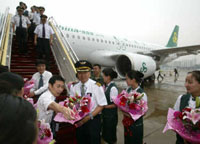
Shanghai's first budget airline is poised to take off with the delivery of one of its three leased aircraft to Hongqiao Airport yesterday.
The other two Airbus 320s that make up Shanghai Spring International Travel Service's initial fleet of aircraft are scheduled for delivery in the coming months. Shanghai Spring is one of China's largest privately-owned travel service companies with 50 outlets in Shanghai and representative offices in other major cities, including Beijing, Xi'an and Guangzhou.
Leveraging on its vast network of travel agencies, Li Weimin, Shanghai Spring's marketing director, said that he expected his company could give the established airlines "a run for their money."
Shanghai Spring has stated that it would launch its first passenger flight from Hongqiao to Yantai, the sea-side resort in East China's Shandong Province, on July 18. More tourist destinations would be added as soon as "we can get approval," Li said. They include Guilin, Nanchang and Mianyang.
However, the company's plan must be ratified by the relevant authorities. A public hearing of Shanghai Spring's budget airline proposal was held on June 29. "We don't want to make any predictions (on regulatory matters)," said Li, but "we are making all the preparations to get ready for the launch," he said.
More than 10 other Chinese enterprises are reported to have applied for licenses to operate their own budget airlines since the government took the decision to restructure the nation's airline industry. In Shanghai, another enterprise, Junyao Group, is known to have also submitted a proposal to operate discount-fare flights out of Hongqiao.
Meanwhile, Bangkok-based Air Asia has already begun operating regular flights between Fuzhou in eastern Fujian Province and Bangkok at fares that represent a big discount to those charged by other airlines.
Li and others said that no-frills budget flights, which are becoming increasingly popular in the US and Europe, should make a particularly big impact in China where regular fares are much higher relative to average living costs. Shanghai Spring's operation mode is similar to those adopted by many foreign budget airlines, according to Li.
To cut operating costs, no meals or snacks will be served on any of the flights. Instead, each passenger will receive a complimentary bottle of distilled water. In addition, check-in luggage will be limited to 15 kilograms, at least 25 per cent less than that allowed on regular flights. A lighter load, Li said, could help save fuel costs.
Li said that his company hoped to achieve a load factor of 85 per cent in the first year of operation. The average for regular Chinese mainland airlines is about 70 per cent. Over the past seven years, Shanghai Spring has chartered about 30,000 flights, all of which were full.
If the major airlines are worried about potential competition from the budget upstarts, they are not showing it. None of the major airline companies have indicated that they have any plans to follow Singapore Airline in establishing offshoots to compete in the budget travel market.
In a management talk show televised nationally last month, several senior airline executives said they were not worried about competition from the budget airlines, which are not expected to operate on the more lucrative routes between major cities, such as Beijing, Shanghai and Guangzhou, in the foreseeable future.
(China Daily July 13, 2005)
|

